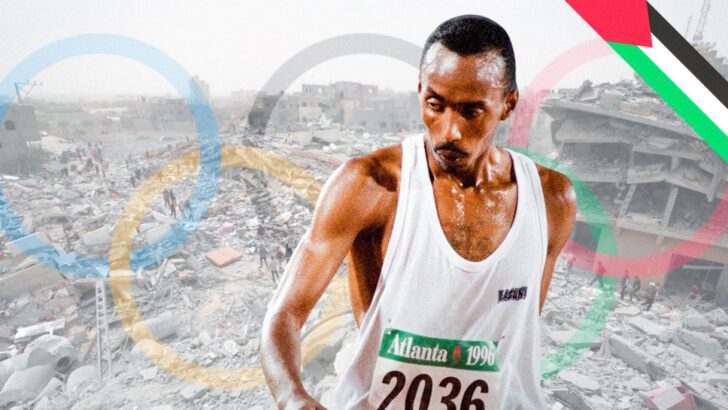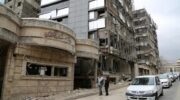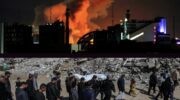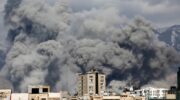Majed Abu Maraheel, the first Palestinian Olympian, is in the hearts of Palestinian athletes following his death in the Nuseirat Camp earlier this year
by Saoud Khalaf, reposted from The New Arab, July 23, 2024
It’s Gaza, 1996. Thirty-two-year-old father of five, Majed Abu Maraheel, runs along the beach in a tank top, shorts, and shoes that are not ideal for running, unknown to the beachgoers around him.
It’s uncommon for anyone to run along the Gazan coastline, but Majed’s story isn’t that of the common man.
Unable to give up his job as a security guard due to his family responsibilities, Majed trains relentlessly whenever he’s not raising his children.
He navigates Gaza’s overcrowded and densely populated streets, in a turquoise and white tracksuit, with Olympic dreams on his mind.
“I only know what it’s like to run in the streets,” he said in an interview with AP at the time.
“We want to prove to the world and all the human beings who are betting against us that we are here and existing — in sports, politically and in all aspects. We want to establish in these Games the name of Palestine so that no one can eradicate the name of Palestine from history.”
On July 26, 1996, Majed became the first flag bearer for Palestine at the Olympic Games and the first athlete to ever compete, taking part in the 10,000 meters and finishing 21st.
What a moment it must have been to raise his flag high for the entire world to see, especially when committing the same act on his own land would land him in serious jail time, with the symbol having been banned after more Palestinian land was further occupied by Israel in 1967.
“Even minors as young as 10 years old were not immune to the far reach of military law and were occasionally sent to prison for waving the forbidden flag,” +972 magazine has reported.
His successes continued to mount as he went on to become a renowned coach for other Palestinian athletes who would go on to compete in future Olympic tournaments.
However, Majed Abu Maraheel was not present for the 28th anniversary of his revolutionary 1996 appearance.
Majed died on June 12, 2024, in the Nuseirat Refugee Camp in Gaza, due to medical shortages and power outages that prevented him from accessing adequate treatment for kidney failure.
Earlier, his family had tried to help him evacuate through the Rafah crossing to Egypt, but it was impossible as it was subsequently closed by Israel.
A March report by the Euro-Med Human Rights Monitor revealed that there were approximately 1,000 to 1,500 kidney failure patients in Gaza. Four months on, we can only wonder how many have survived.
Despite his numerous accomplishments and the status he had achieved through his athletic prowess, as well as the skills he had imparted to his prodigious students who went on to follow in his footsteps, Majed’s death last month amounted, sadly, to nothing more than a statistic in the highly censored and widely invalidated Palestinian death toll in Gaza, much like nearly all the others who have died under siege from Israel.
In the past ten months, not only has the sanctity of human life been violated, but all forms of infrastructure and the history of society have been destroyed as well.
Earlier this year, the Palestinian Olympic Committee was shelled, along with five other sports facilities in Gaza.
Olympism’s values of excellence, respect, and friendship: Why are there no repercussions for Israel?
The beauty and essence of the Olympic Games lie in the equal opportunity they provide for athletes from any background to represent their homeland on an international stage.
For example, Yusra Mardini competed under the banner of the Refugee Olympic Athletes Team at the 2016 Summer Olympics in Rio de Janeiro, after fleeing Syria during the war.
She had reached Europe by jumping into the ocean and swimming, pushing a boat full of refugees (including her own family) after the motor broke in the Aegean Sea between Turkey and Greece.
Her travels on foot led her through Europe to Germany, where they eventually settled, and her own Olympic dreams set sail.
“The three values of olympism are excellence, respect and friendship. They constitute the foundation on which the Olympic movement builds its activities to promote sport, culture and education with a view to building a better world,” reads the Olympic website.
One would think that, based on these concepts, equal human rights would be applied across the board regarding the treatment of all athletes and their abilities or participation in events. Why is it, then, that after committing nine months of genocide, Israel faces no repercussions or threat to its Olympic status?
“The unilateral decision taken by the Russian Olympic Committee on 5 October 2023 to include, as its members, the regional sports organizations which are under the authority of the National Olympic Committee (NOC) of Ukraine (namely Donetsk, Kherson, Luhansk and Zaporizhzhia) constitutes a breach of the Olympic Charter because it violates the territorial integrity of the NOC of Ukraine, as recognized by the International Olympic Committee (IOC) in accordance with the Olympic Charter,” was a statement made by the International Olympic Committee in October 2023.
Palestinians cannot be erased
The past ten months have only further reinforced the already known reality for the Palestinian people: they are not viewed equally to their Israeli counterparts in all aspects of life.
It is not a shock to anyone familiar with the Palestinian cause that the International Olympic Committee (IOC) can so blatantly apply double standards.
While the IOC has sanctioned Russia, IOC President Thomas Bach, when asked about Israeli teams and athletes not taking part in the Paris Olympics, responded, “No, there is no question about this.”
Amidst this gruesome Israeli siege, where the death toll in Gaza is suggested to have surpassed 40,000, Palestinians continue to do what they have always done: resist the erasure of their people, culture, history, and achievements by defiantly existing on the international stage.
For all those spectators watching the Paris Games, how many truly understand the hardships faced by Palestinian athletes to reach this stage?
How many athletes were killed before they could even raise their flag?
Majed Abu Maraheel was the first among many, setting a precedent that inspired a nation under siege to thrive in the world of sports, using this platform as an opportunity to advocate for their own liberation and freedom like no other.
Saoud Khalaf is a British-born Iraqi filmmaker and writer based in London. His videos, which have garnered millions of views across social media, focus on social justice for marginalised groups with specific attention on the Middle East. His latest documentary premiered at the Southbank Centre for Refugee Week. Follow him on Twitter: @saoudkhalaf_
Palestine in the 2024 Olympics – who participated and who did not
In the lead-up to the 2024 Olympics, concerns were raised about the ability of Palestinian athletes to participate due to the destruction of sporting facilities and the deaths and injuries of many athletes.
Nagham Abu Samra, Palestinian female icon and karateka, national volleyball team members Ibrahim Qusaya and Hassan Zuaiter, national athletics coach Bilal Abu Samaan, and Palestinian Olympic football team coach Hani al-Masdar were all killed in Israel’s genocide.
Gazan weightlifter Mohammed Hamada, who had competed in the 2020 Olympics, lost 20 kg (44 lb) in the Israeli-imposed famine and injured his knee while transporting water, thus failing to qualify for the 2024 event.
The paracyclist Hazem Suleiman, who had his leg amputated after being shot during the 2018–2019 Gaza border protests, will be unable to compete in the Summer Paralympics in late August because the outbreak of the war halted his training.
Palestine’s only Paralympian for the 2024 event will be Gazan shot putter Fadi Deeb, who lost over fifteen members of his family, including his brother, in Israeli attacks.
Eight Palestinians participated in the 2024 Olympics – the highest number ever.
‘Our way of showing resistance’: Olympians raise Palestinian flag at Paris Games

Ten months into a brutal war that has killed tens of thousands of people in Gaza, Palestinian athletes were aiming for a lot more than medals at the Paris Olympics, hoping to shed light on the suffering of Gazans as they fly the colors of a stateless people scattered across the globe.
by Benjamin Dodman, reposted from France24, August 8, 2024
Yazan al-Bawwab’s first and only race of the Games lasted less than a minute – long enough to have the colors of the Palestinian Territories projected onto his lane at the Olympic pool near Paris.
It was a fleeting appearance for both flag and athlete; but to the 24-year-old swimmer, it meant the world.
“France, like many European countries, still doesn’t see Palestine as a country,” he told FRANCE 24. “But we have a lane here at the Paris Olympics.”
A two-time Olympian, al-Bawwab is one of eight athletes representing Palestine at the Games, competing in such diverse sports as boxing, judo, athletics and taekwondo. Most were born outside the Palestinian Territories but remain deeply tied to their parents’ and grandparents’ homeland.

“We’re 15 million Palestinians scattered around the world. I’m just one who’s able to give a voice to a people who are not heard,” said al-Bawwab, the son of Palestinian refugees who was born in Saudi Arabia and raised in Dubai.
“It’s an honor to raise my flag in a country that does not recognize Palestine,” added the Palestinian (swimmer), who swam with a Palestinian flag tattooed on his chest. “It’s my way of showing resistance.”
Representing a people
Palestinian athletes have taken part in every Summer Olympics since they were first admitted to the Atlanta Games in 1996. Each participation has carried a special significance for residents of the Palestinian Territories and the Palestinian diaspora, giving the stateless people a venue in which to compete with the rest of the world.
“We’re definitely diplomats for our people as well as athletes,” US-born runner Layla Almasri told reporters after competing in the women’s 800 meters. Speaking of Palestine, she added: “It’s in my blood and it’s in my heart.”
“We’re trying to show the world that we’re athletes, that we want to play sports like everybody else, that we want to have the same rights as everybody else,” added al-Bawwab. “And sport is one tool we can use because we are not treated as human beings right now.”
Taking part in the Paris Games is all the more significant in the context of the war that has devastated most of the Gaza Strip and killed close to 40,000 people, according to health officials in the Hamas-held enclave, including some of the athletes who had set their sights on the Summer Olympics.

Some 400 athletes, coaches and other staff are estimated to have died since October, according to the Palestine Olympic Committee (POC). Victims include Olympic football team coach Hani Al-Masdar and volleyball star Ibrahim Qusaya, both of them killed by Israeli bombs in Gaza.
Another prominent casualty is the long-distance runner Majed Abu Maraheel, who in 1996 in Atlanta became the first Palestinian to compete in the Olympics. He died of kidney failure after he was unable to be treated in Gaza and could not be evacuated to Egypt, Palestinian officials said.
Spotlight on Gaza
The war triggered by the October 7 Hamas-led attacks on Israel has stoked tensions in Paris, with Israeli athletes arriving to events under a heavy police escort. Recently, Paris prosecutors said they had opened an investigation into death threats emailed to Israeli athletes.
While Israel has called for the Olympics to remain a neutral space, the Palestinian delegation has used the Games as a platform to shed light on the plight of Gaza. The POC has also asked the International Olympic Committee (IOC) to boycott Israeli athletes over the continuing bombardment of Gaza.
“There’s no words to describe what’s happening back home,” said al-Bawwab. “Our people are not dreaming about gold medals. They’re dreaming about basic human rights, about food and water.”
The Palestinian athletes have been riding a wave of popular sympathy since their arrival at Charles de Gaulle airport on the eve of the Games. They walked through a sea of Palestinian flags at the Paris hub and were greeted with gifts of food and roses.
Their presence at the Olympics, after nine months of devastating warfare, is a statement in itself. Training in Gaza, the West Bank and east Jerusalem is a challenge at the best of times. The war has made that challenge next to impossible, with Gaza’s sporting infrastructure now demolished.
Only one Palestinian athlete, 18-year-old Omar Yaser Ismail, qualified for the Paris Games in his own right, earning his spot on the team at a taekwondo qualification tournament in China. The seven others were selected under a wild-card system designed to enable athletes from poorer nations to compete.
Athletes who missed out included Gaza-based weightlifter Muhammad Hamada, Palestine’s flag bearer at the 2021 Tokyo Olympics, who continued training even as Israeli bombs rained down on the enclave but eventually lost too much weight due to the shortage of food.
Children of Gaza ‘the real heroes’
Ahead of the Olympics, the POC’s technical director Nader Jayousi told FRANCE 24 his delegation would aim to send a “message of peace” to the world, while also hoping to inspire “our children whose dreams have been shattered by bombs and rockets”.
Ismail, the taekwondo fighter, was inconsolable on Wednesday as his dreams of an Olympic medal were abruptly extinguished in the French capital’s majestic Grand Palais.
The Palestinian was within five seconds of reaching the third round in the 58kg weight division until a kick to the head by his Spanish opponent sent him crashing out of the tournament. He fell to his knees in tears, his efforts rewarded by a lengthy ovation from the crowd.
“All of this, it’s for Palestine,” Ismail had told reporters ahead of the fight. “It’s true that we play and fight, but the real heroes are the children of Palestine and the children of Gaza.”
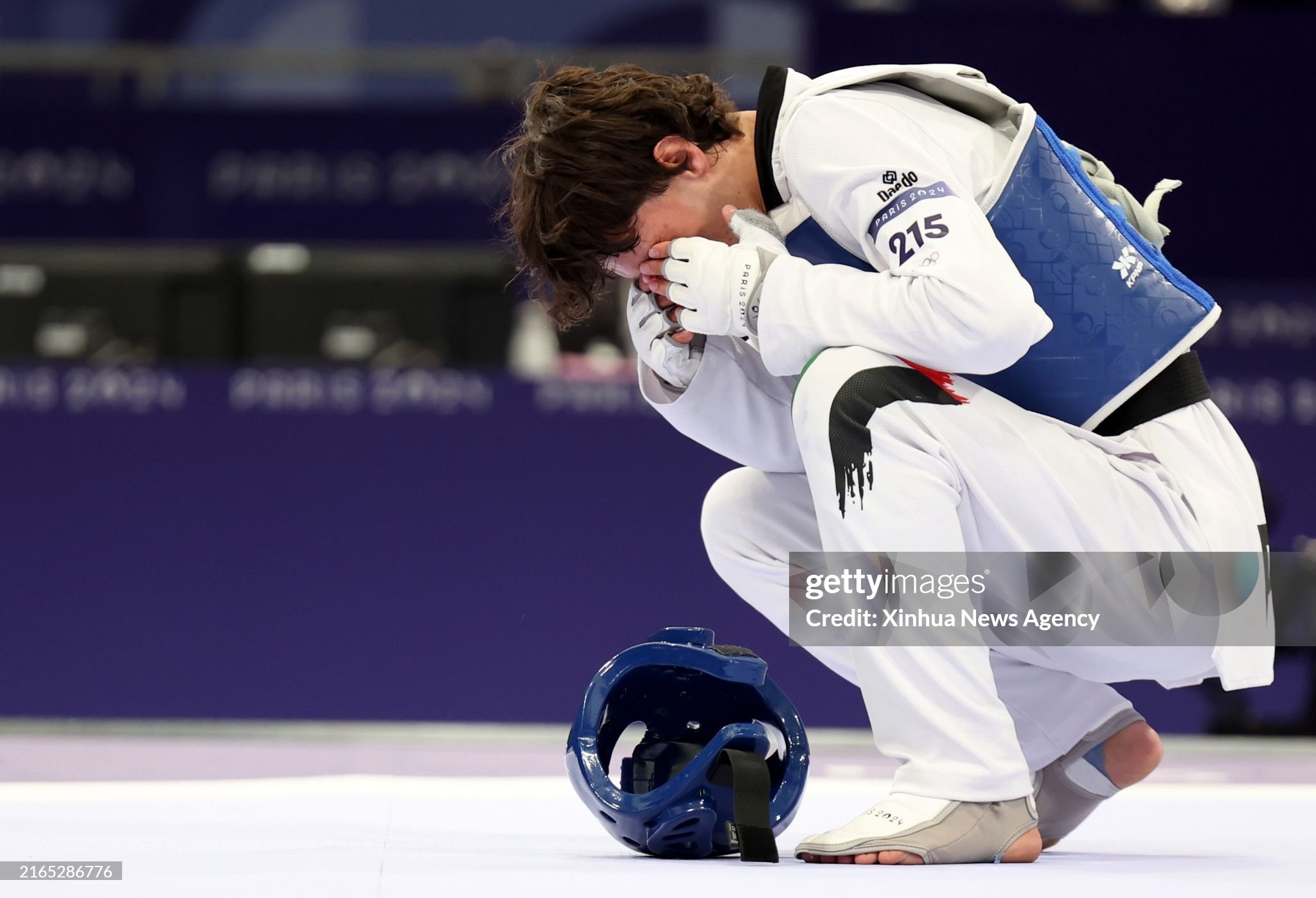
Palestinian-American swimmer Valerie Tarazi, who competed in the 200-metre individual medley, echoed his words, telling Reuters: “Every time I swim, every time I jump in the pool, I’m thinking about the people of Palestine, their struggles. And I just want to represent them in the best way possible.”
Al-Bawwab said he did not expect recognition for his performance in the pool, which saw him post one of the slowest times in the 100-meter backstroke heats.
“Other athletes are here to talk about their medals and their times, but nobody cares about my medals, my times,” he said. “I’m here to talk about a war going on in my country. It’s unfortunate, but this is my role and I’m very proud to carry the flag and send this message to the world.”
Benjamin Dodman writes for France 24.
RELATED ARTICLES
- Boycotting Russia is compulsory, while boycotting Israel is punished
- The Olympics: Do Only Israeli Victims Matter?
- Shattered Limbs, Broken Dreams: Life for Gaza Athletes after Surviving Israeli Bullets
- Media bias: CNN and NPR are afraid to say “Apartheid” out loud
- Following the money: How pro-Israel megadonors are working to stop politicians who might uphold Palestinian rights
- JJ Goldberg: A Major Jewish Philanthropist Just Published A Plan To Ethnically Cleanse Palestinians
- No, the UN did not create Israel – its war of ethnic cleansing did it

